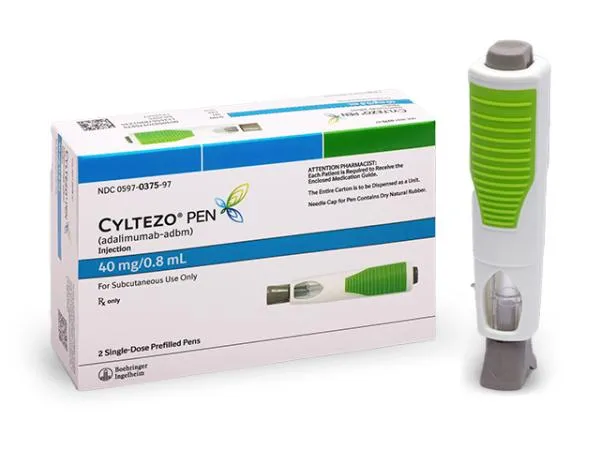Comprehensive Guide to Adalimumab: Uses, Dosage, Side Effects, and More
What is Adalimumab?
Overview of Adalimumab
Generic Name: Adalimumab
Brand Name: Humira, Amjevita, Cyltezo, Hadlima, Hyrimoz, Imraldi (Europe)
Drug Group: Tumor necrosis factor (TNF) inhibitor; monoclonal antibody
Commonly Used For
- Rheumatoid arthritis (moderate to severe).
- Psoriatic arthritis.
- Ankylosing spondylitis.
- Crohn’s disease (moderate to severe, adult and pediatric).
- Ulcerative colitis (moderate to severe).
- Plaque psoriasis (moderate to severe).
- Juvenile idiopathic arthritis (age ≥2 years).
- Hidradenitis suppurativa.
- Uveitis (non-infectious, intermediate, posterior, or panuveitis).
Key Characteristics
Form: Subcutaneous injection (prefilled syringe or autoinjector, 10–40 mg).
Mechanism: Neutralizes TNF-α, reducing inflammation and immune-mediated tissue damage.
Approval: Approved by the FDA (2002 for Humira) and EMA (2003) for multiple indications.

Indications and Uses of Adalimumab
Rheumatoid Arthritis: Reduces joint pain, swelling, and damage in adults with moderate to severe disease.
Psoriatic Arthritis: Manages joint and skin symptoms in adults.
Ankylosing Spondylitis: Improves spinal mobility and reduces pain.
Crohn’s Disease: Induces and maintains remission in adults and children ≥6 years.
Ulcerative Colitis: Achieves remission in adults with moderate to severe disease.
Plaque Psoriasis: Treats moderate to severe chronic plaque psoriasis in adults.
Juvenile Idiopathic Arthritis: Reduces symptoms in children ≥2 years.
Hidradenitis Suppurativa: Manages moderate to severe cases in adults and adolescents.
Uveitis: Controls inflammation in non-infectious uveitis.
Off-Label Uses: May be used for conditions like sarcoidosis or Behçet’s disease under specialist guidance.
Dosage of Adalimumab
Dosage for Adults
Rheumatoid Arthritis, Psoriatic Arthritis, Ankylosing Spondylitis: 40 mg every other week, subcutaneously.
Crohn’s Disease, Ulcerative Colitis:
- Induction: 160 mg (Week 0, as four 40 mg injections in one day or two 40 mg injections over two days), followed by 80 mg (Week 2).
- Maintenance: 40 mg every other week.
Plaque Psoriasis, Uveitis:
- Induction: 80 mg (Week 0).
- Maintenance: 40 mg every other week starting Week 1.
Hidradenitis Suppurativa:
- Induction: 160 mg (Week 0), 80 mg (Week 2).
- Maintenance: 40 mg weekly starting Week 4.
Dosage for Children
Juvenile Idiopathic Arthritis:
- Weight 10–<15 kg: 10 mg every other week.
- Weight 15–<30 kg: 20 mg every other week.
- Weight ≥30 kg: 40 mg every other week.
Crohn’s Disease (≥6 years):
- Weight 17–<40 kg: Induction (80 mg Week 0, 40 mg Week 2); maintenance (20 mg every other week).
- Weight ≥40 kg: Adult dosing.
Dosage for Pregnant Women
Pregnancy Category B: Limited data suggest no clear risk, but use only if benefits outweigh risks. Consult a rheumatologist or gastroenterologist.
Dosage Adjustments
Renal/Hepatic Impairment: No specific adjustments; monitor closely for adverse effects.
Methotrexate Co-Use: Often used with methotrexate in rheumatoid arthritis, potentially at lower doses.
Missed Dose: Administer as soon as possible; resume regular schedule unless close to the next dose.
Additional Considerations
- Administer under medical supervision initially to ensure proper injection technique.
- Monitor for infections or other adverse effects during therapy.
How to Use Adalimumab
Administration: The drug is injected subcutaneously using a prefilled syringe or autoinjector. Healthcare providers should train patients on proper technique.
Injection Sites: Rotate sites (e.g., thigh, abdomen) to avoid irritation; avoid tender, bruised, or scarred areas.
Timing: Administer every other week or weekly, depending on the condition, at consistent times.
Missed Dose: Inject as soon as remembered unless it’s nearly time for the next dose; do not double doses. Consult your doctor if multiple doses are missed.
Additional Tips:
- Allow the medication to reach room temperature (15–30 minutes) before injection to reduce discomfort.
- Do not shake the syringe or autoinjector.
Contraindications for Adalimumab
Patients with hypersensitivity to Adalimumab or its components.
Those with active tuberculosis (TB) or other severe infections (e.g., sepsis, fungal infections).
Patients with moderate to severe heart failure (NYHA Class III/IV).
Warnings & Precautions for Adalimumab
General Warnings
Infections: Adalimumab increases the risk of serious infections, including TB, bacterial sepsis, and invasive fungal infections. Screen for latent TB and hepatitis B before starting therapy.
Malignancies: Increased risk of lymphoma and other cancers, particularly in children and adolescents. Monitor for unusual symptoms.
Heart Failure: May worsen heart failure; use cautiously in patients with cardiac conditions.
Hepatitis B Reactivation: Risk of HBV reactivation in carriers; test and monitor HBV status.
Demyelinating Diseases: Rare cases of multiple sclerosis or optic neuritis; avoid in patients with a history of these conditions.
Use in Specific Populations
Pregnancy: Category B; no clear evidence of harm, but data are limited. Enroll in pregnancy registries if used.
Breastfeeding: Likely excreted in breast milk in small amounts; weigh benefits against risks.
Elderly: Increased risk of infections and malignancies; monitor closely.
Children: Safe for specific indications (e.g., JIA, Crohn’s) in children ≥2 years; specialist oversight required.
Immunosuppressed Patients: Avoid live vaccines during therapy.
Additional Precautions
- Inform your doctor about all medical conditions, especially infections, heart disease, or neurological disorders.
- Avoid live vaccines (e.g., measles, varicella) while on this medication.
Overdose and Management of Adalimumab
Overdose Symptoms
Adalimumab overdose is rare due to fixed dosing but may cause:
- Increased risk of infections.
- Exaggerated side effects (e.g., injection site reactions, fatigue).
- Potential immune suppression.
Immediate Actions
Contact Healthcare Provider: Seek medical advice immediately.
Monitor: Watch for signs of infection or other adverse effects.
Supportive Care: Manage symptoms as needed; no specific antidote exists.
Additional Notes
- Overdose risk is low with proper administration by trained patients or professionals.
- Store the drug securely to prevent misuse.
Side Effects of Adalimumab
Common Side Effects
- Injection site reactions (redness, pain, swelling; 12–20%)
- Upper respiratory infections (17%)
- Headache (12%)
- Rash (6–12%)
- Nausea or abdominal pain
These effects are often mild and may resolve with continued use.
Serious Side Effects
Infections: Fever, persistent cough, or signs of TB (e.g., night sweats, weight loss).
Allergic Reactions: Rash, hives, swelling, or difficulty breathing.
Hepatotoxicity: Jaundice, dark urine, or right-sided abdominal pain.
Blood Disorders: Unusual bruising, bleeding, or severe fatigue.
Neurologic: Numbness, tingling, or vision changes.
Additional Notes
- Regular monitoring for infections and liver function is essential.
- Report persistent or severe symptoms to your healthcare provider.
Drug Interactions with Adalimumab
The medication may interact with:
Other Biologics (e.g., Etanercept, Infliximab): Increased infection risk; avoid coadministration.
Immunosuppressants (e.g., Methotrexate, Azathioprine): May enhance efficacy but increase infection risk.
Live Vaccines: Contraindicated due to risk of vaccine-related infections.
CYP450 Substrates (e.g., Warfarin, Cyclosporine): Adalimumab may alter metabolism; monitor closely.
Patient Education or Lifestyle
Medication Adherence: Inject Adalimumab as prescribed to maintain disease control. Refill prescriptions early to avoid interruptions.
Infection Prevention: Wash hands frequently, avoid sick contacts, and report signs of infection (e.g., fever, cough) immediately.
Vaccinations: Complete all non-live vaccines (e.g., flu, pneumococcal) before starting therapy; avoid live vaccines.
Lifestyle: Maintain a balanced diet, regular exercise (as tolerated), and avoid smoking to support overall health.
Sun Protection: The drug may increase skin sensitivity; use sunscreen and protective clothing.
Monitoring: Attend regular appointments for blood tests (e.g., liver function, complete blood count) and TB screening.
Travel: Discuss travel plans with your doctor, especially to areas with high TB prevalence.
Pharmacokinetics of Adalimumab
Absorption: Subcutaneous administration; peak plasma concentration (4.7 ± 1.6 mcg/mL) at ~131 ± 56 hours after a 40 mg dose.
Bioavailability: ~64% for subcutaneous injection.
Distribution: Volume of distribution is 4.7–6.0 L; primarily extracellular.
Metabolism: Degraded via proteolysis; no significant hepatic metabolism.
Excretion: Not fully characterized; likely cleared as peptide fragments.
Half-Life: ~10–20 days (average 2 weeks), supporting every-other-week dosing.
Pharmacodynamics of Adalimumab
Adalimumab is a recombinant human IgG1 monoclonal antibody that:
- Binds specifically to TNF-α, preventing its interaction with p55 and p75 cell surface receptors.
- Inhibits TNF-α-mediated inflammation, reducing cytokine production and tissue damage.
- Modulates adhesion molecules responsible for leukocyte migration.
- Demonstrates no significant binding to other cytokines, ensuring targeted action.
Storage of Adalimumab
Temperature: Store in a refrigerator (2–8°C or 36–46°F); do not freeze.
Protection: Keep in original carton to protect from light.
Safety: Store out of reach of children to prevent accidental misuse.
Travel: Use a cooler with ice packs for transport; do not expose to temperatures >25°C (77°F) for >14 days.
Disposal: Follow local regulations or consult a pharmacist for safe disposal of unused or expired medication.
Frequently Asked Questions (FAQs)
Q: What conditions does Adalimumab treat?
A: The drug treats rheumatoid arthritis, Crohn’s disease, ulcerative colitis, psoriasis, and other autoimmune conditions.
Q: Can Adalimumab increase infection risk?
A: Yes, the medication increases the risk of serious infections, including TB. Screen for infections before and during therapy.
Q: How is Adalimumab administered?
A: It is injected subcutaneously every other week or weekly, using a prefilled syringe or autoinjector.
Q: Is Adalimumab safe during pregnancy?
A: Category B; use only if needed, as data are limited. Consult your doctor and consider pregnancy registries.
Q: Can I receive vaccines while on Adalimumab?
A: Avoid live vaccines; non-live vaccines (e.g., flu) are safe but should be given before starting therapy.
Regulatory Information
The drug is approved by:
U.S. Food and Drug Administration (FDA): Approved in 2002 (Humira) for multiple autoimmune conditions.
European Medicines Agency (EMA): Approved in 2003 for similar indications in the European Union.
Other Agencies: Approved globally (e.g., Drug Administration of Vietnam) for autoimmune diseases; consult local guidelines.
References
- U.S. Food and Drug Administration (FDA). (2023). Humira (Adalimumab) Prescribing Information.
- Official FDA documentation detailing the drug’s approved uses, dosage, and safety for the USA.
- European Medicines Agency (EMA). (2023). Humira (Adalimumab) Summary of Product Characteristics.
- EMA’s comprehensive information on the medication’s indications and precautions in Europe.
- National Institutes of Health (NIH). (2023). Adalimumab: MedlinePlus Drug Information.
- NIH resource providing detailed information on the drug’s uses, side effects, and precautions.
- World Health Organization (WHO). (2023). WHO Model List of Essential Medicines: Adalimumab.
- WHO’s inclusion of Adalimumab as an essential medicine for autoimmune diseases.
- The Lancet Rheumatology. (2020). Adalimumab in Rheumatoid Arthritis and Other Inflammatory Diseases.
- Peer-reviewed article on the medication’s efficacy in autoimmune conditions (note: access may require a subscription).
